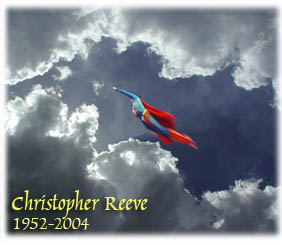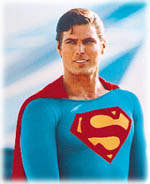|
 Hollywood
casting is a nutty process that's seldom as simple as just
finding the ideal candidate for the role, but every now
and then they really do get it right. Back when Superman:The
Movie was coming together, there was pressure from on
high to put a known quantity like Robert Redford or Burt
Reynolds in the cape and tights. To their credit, the producers
held out for a fresh face, an unknown actor who wouldn't
bring along the baggage of prior roles or personal fame. Hollywood
casting is a nutty process that's seldom as simple as just
finding the ideal candidate for the role, but every now
and then they really do get it right. Back when Superman:The
Movie was coming together, there was pressure from on
high to put a known quantity like Robert Redford or Burt
Reynolds in the cape and tights. To their credit, the producers
held out for a fresh face, an unknown actor who wouldn't
bring along the baggage of prior roles or personal fame.
In the end, they settled on Christopher Reeve,
a serious-minded young Julliard graduate with a strong resemblance
to the comic book Superman and, as it turned out, an understanding
of and kinship with the character that made him a superhero
in his own right. Ultimately it would become difficult to
tell where the actor ended and the character began.
In his every scene as the Man of Steel, Reeve
conveyed with grace and seeming effortlessness the essential
core of Superman: the kindness, compassion and big-heartedness
of a being who has unlimited power and dedicates it to the
service of others. There has to be a temptation for actors
to approach this type of role from one of two extremes;
either swaggering around with deadly serious, macho bombast
or spoofing the genre with tongue planted firmly in cheek.
Reeve took a new tack and gave us a Superman who was comfortable
in his own skin, neither anxious to prove his superiority
nor apologetic for walking around in tights. He wore the
cape as royalty wear their raiments, not with showy bravado
but with the casual ease that comes from being born to greatness.
The publicity machine for "Superman"
put forth one of the most memorable tag lines in moviedom:
"You will believe a man can fly." The fact
that they delivered on this promise was due as much to Christopher
Reeve as to the teams of special effects artists who toiled
on the film. Reeve spent untold hours in harness, suspended
over a studio floor in front of a bluescreen, working to
create the illusion of graceful flight. As a glider pilot,
he knew something about aerodynamics and with subtle gestures
and shifts of his frame was able to convincingly suggest
the way a body might indeed soar along the currents and
thermals, if only we could beat that ancient spoiler of
dreams, gravity.
Reeve went on to do three Superman sequels
of (it must be said) wildly varying quality. He also made
a name for himself as a "serious" actor in such
films as Death Trap, Remains of the Day and the cult
favorite Somewhere in Time. But unlike other veterans
of comics-based projects, he never felt "above"
his most famous role, or looked down on it in any way. He
remained proud of his work as Superman and spoke of the
character with fondness and reverence.
In May of 1995, an accident robbed Reeve of
his mobility and very nearly his life. Paralyzed from the
neck down, he showed in his darkest hour what heroism is
really about. He became an advocate for disabled persons
and led the fight for medical research that he felt may
have returned mobility to himself and others. He continued
to work in films and win awards for that work. He wrote
a bestselling memoir. He gave other paraplegics a reason
to hope for the future. Above all, he never gave up the
struggle to live life on his own terms, becoming in the
process the closest thing many of have seen to a real Superman.
"A hero," he once said, "is an
ordinary individual who finds the strength to persevere
and endure in spite of overwhelming obstacles.
I believe Christopher Reeve showed the world,
on screen and off, what it means to be a hero. As Superman
he could bend steel in his bare hands and change the course
of mighty rivers. As Chris Reeve, in the end, he was happy
to lift his index finger without assistance. But he showed
us that acts of true heroism don't rely on how big your
muscles are or what they can or cannot do. The strength
that really matters is in the heart and mind and spirit
of each of us. What matters is to take whatever it is you've
been given -- in Superman's case the powers of a god or
in Reeves' case, ultimately, just the power of celebrity,
unflagging optimism and a gift for public speaking -- and
turn it to the greater good.
In a treasured comic book story from the Silver
Age, Superman, convinced he's close to dying, performs great
works on behalf of humanity and leaves behind a final message.
Burned onto the surface of the moon by heat vision, it reads,
"Do good to others and every man can be a Superman."
It was a message Christopher Reeve heard, understood and
passed on in his own way to a world of people who never
read a comic book. He leaves behind him a legacy of personal
courage and public service, a world better educated to the
plight of the handicapped, a medical profession more focused
on a cure and audiences reassured that the best qualities
of their onscreen idols don't have to evaporate when the
production lights turn off.
A few years ago my nephew stopped in the middle
of some backyard game to announce, "Now I'm Superman."
Since we'd never discussed the character before, he thought
he should offer some explanation of who Superman is: "He
helps people." It's hard to convey how heart-warming
it was to know a kid of seven, obsessed with feats of might
and power, understood so clearly what really mattered about
the character, and that he could sum it up so completely
in three little words. I was reminded of the moment on screen
when Margot Kidder's Lois Lane first meets the Man of Steel
and asks, "Who are you?" This is his big chance
to stand with arms akimbo and feet planted apart, cape flowing
in the breeze, and bark out authoritatively, "You can
call me...SUPERMAN!" Instead, Reeves' Superman gives
a kind, reassuring smile and says, "A friend."
That's the real Superman; he's not here for adulation, he's
just here to help.
When we lost Christopher Reeve, we all lost
"a friend," whether we'd met him or not. He made
us believe a man could fly. More, he proved to us that we
all can fly. Turns out the secret's not in the leg muscles,
after all.
|
So many of our
dreams at first seem impossible, then they seem
improbable, and then, when we summon the will, they
soon become inevitable.
- Christopher
Reeve (1953-2004)
|
 |
Graphic at top of page
created by Jim Bowers of CapedWonder.com!
|


